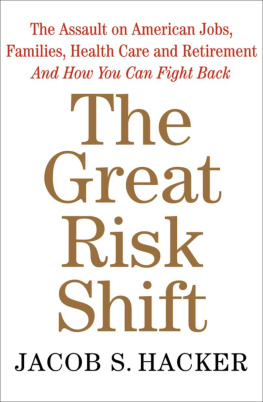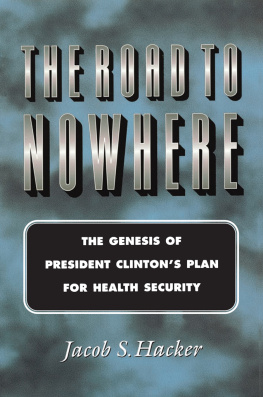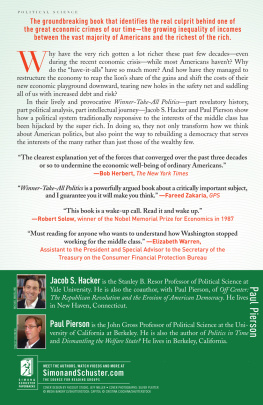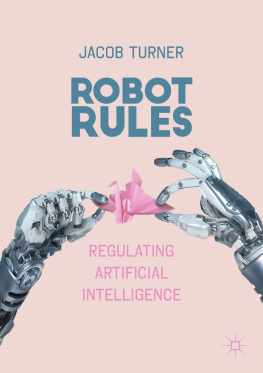Jacob S. Hacker - Let Them Eat Tweets: How the Right Rules in an Age of Extreme Inequality
Here you can read online Jacob S. Hacker - Let Them Eat Tweets: How the Right Rules in an Age of Extreme Inequality full text of the book (entire story) in english for free. Download pdf and epub, get meaning, cover and reviews about this ebook. year: 2020, publisher: Liveright, genre: Politics. Description of the work, (preface) as well as reviews are available. Best literature library LitArk.com created for fans of good reading and offers a wide selection of genres:
Romance novel
Science fiction
Adventure
Detective
Science
History
Home and family
Prose
Art
Politics
Computer
Non-fiction
Religion
Business
Children
Humor
Choose a favorite category and find really read worthwhile books. Enjoy immersion in the world of imagination, feel the emotions of the characters or learn something new for yourself, make an fascinating discovery.

- Book:Let Them Eat Tweets: How the Right Rules in an Age of Extreme Inequality
- Author:
- Publisher:Liveright
- Genre:
- Year:2020
- Rating:5 / 5
- Favourites:Add to favourites
- Your mark:
- 100
- 1
- 2
- 3
- 4
- 5
Let Them Eat Tweets: How the Right Rules in an Age of Extreme Inequality: summary, description and annotation
We offer to read an annotation, description, summary or preface (depends on what the author of the book "Let Them Eat Tweets: How the Right Rules in an Age of Extreme Inequality" wrote himself). If you haven't found the necessary information about the book — write in the comments, we will try to find it.
Jacob S. Hacker: author's other books
Who wrote Let Them Eat Tweets: How the Right Rules in an Age of Extreme Inequality? Find out the surname, the name of the author of the book and a list of all author's works by series.
Let Them Eat Tweets: How the Right Rules in an Age of Extreme Inequality — read online for free the complete book (whole text) full work
Below is the text of the book, divided by pages. System saving the place of the last page read, allows you to conveniently read the book "Let Them Eat Tweets: How the Right Rules in an Age of Extreme Inequality" online for free, without having to search again every time where you left off. Put a bookmark, and you can go to the page where you finished reading at any time.
Font size:
Interval:
Bookmark:
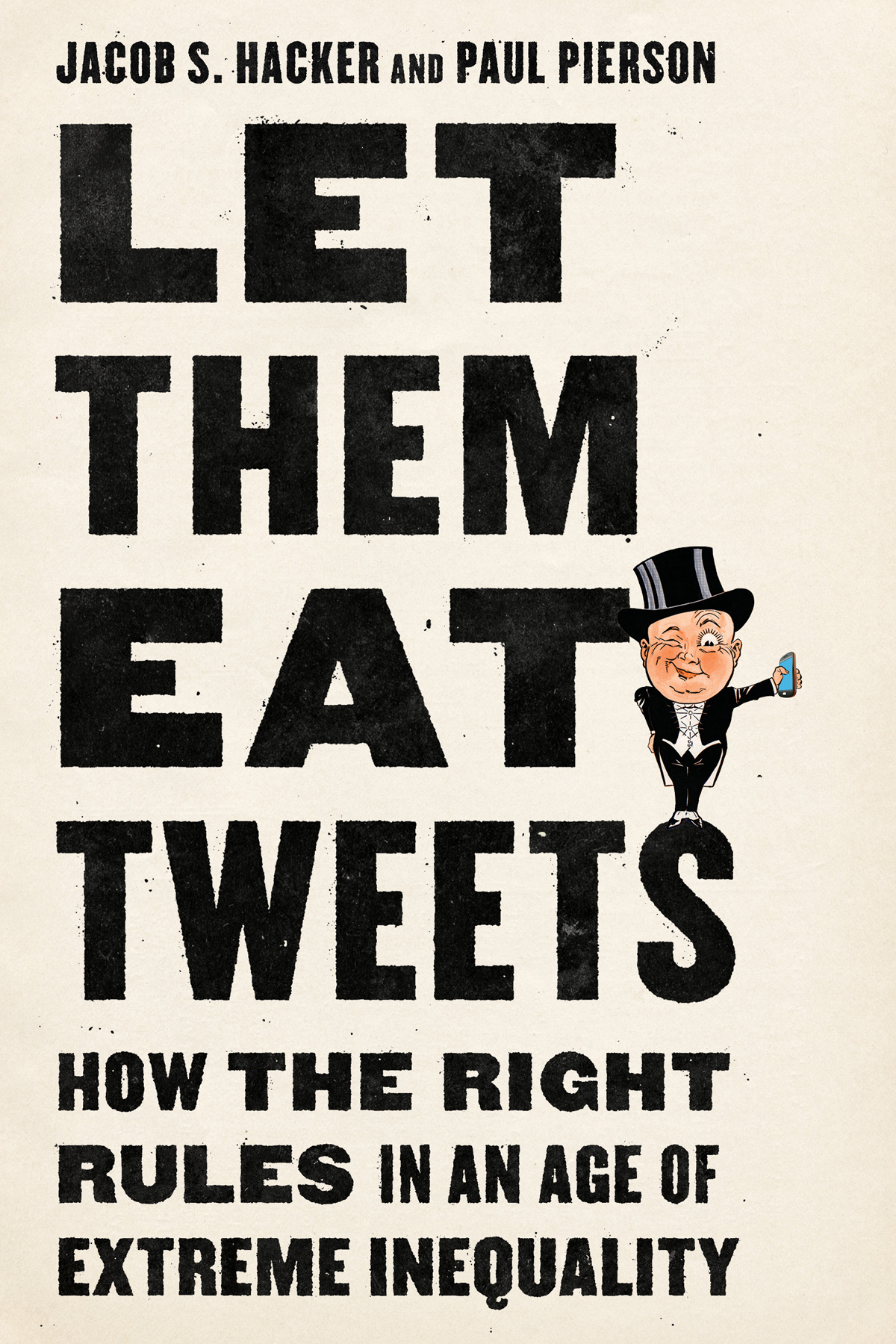
HOW THE RIGHT
RULES IN AN AGE
OF EXTREME INEQUALITY
JACOB S. HACKER
AND PAUL PIERSON

To Oona and Tracey
LET
THEM
EAT
TWEETS
T HIS IS NOT A BOOK ABOUT D ONALD T RUMP .
Instead, it is about an immense shift that preceded Trumps rise, has profoundly shaped his political party and its priorities, and poses a threat to our democracy that is certain to outlast his presidency.
That shift is the rise of plutocracygovernment of, by, and for the rich. Runaway inequality has remade American politics, reorienting power and policy toward corporations and the superrich (particularly the most conservative among them). In the process, it has also remade the Republican Party, transforming a mainstream conservative party into one that is increasingly divisive, distant from the center, and disdainful of democracy. From the White House on down, Republicans now make extreme appeals once associated only with fringe right-wing parties in other rich nations, stoking the fires of white identity and working-class outrage. Yet their rhetorical alliance with the people belies their governing alliance with the plutocrats. Indeed, the rhetorical alliance stems from the governing alliance. To advance an unpopular plutocratic agenda, Republicans have escalated white backlashand, increasingly, undermined democracy. In the United States, then, plutocracy and right-wing populism have not been opposing forces. Instead, they have been locked in a doom loop of escalating extremism that must be disrupted.
The rise of plutocracy is the story of post-1980 American politics. Over the last forty years, the wealthiest Americans and the biggest financial and corporate interests have amassed wealth on a scale unimaginable to prior generations and without parallel in other western democracies. The richest 0.1 percent of Americans now have roughly as much wealth as the bottom 90 percent combined. They have used that wealthand the connections and influence that come with itto construct a set of political organizations that are also distinctive in historical and cross-national perspective. What makes them distinctive is not just the scope of their influence, especially on the right and far right. It is also the degree to which the plutocrats, the biggest winners in our winner-take-all economy, pursue aims at odds with the broader interests of American society.
In all these ways, the rise of plutocracy is also an assault on our democracy. When wealth buys power, the responsiveness of government to ordinary citizens weakens, and the elected officials who are supposed to represent those citizens are pulled toward the positions of economic elites. American plutocracy has transformed both of Americas two great political parties. The most profound effects, however, have been on the Republican Party. As the power of the plutocrats has increased, Americas conservative party has shifted not just to the right of conservative parties in other nations, but to the right of many right-wing parties. And the greatest rightward movement has occurred precisely on those issues where the partys plutocratic supporters have the most radical goals.
On the plutocrats pet issues, the party has raced to the fringe. Republican leaders have become singularly focused on tax cuts for corporations and the superrich, whatever the effects on American inequality, or on the people who make up the Republican base. When those cuts have conflicted with their traditional emphasis on fiscal restraint, they have run up huge deficits to finance them, abandoning the principle of budget balanceexcept as a cudgel with which to attack popular social programs, such as Medicaid, Medicare, and Social Security. They have launched an intensifying assault on environmental, consumer, labor, and financial protections. They have attempted to strip health insurance from millions of Americans. They have appointed the most consistently pro-business, anti-labor, and anti-consumer judges in the modern history of the federal courts. And they have done all this despite the fact that every one of these aims has strikingly little public support, even among Republican voters.
Which raises the obvious question: How? As political scientists, we have spent many years in dialogue with fellow scholars who see a basic harmony between what citizens want and what governments do. Government responsiveness to voters should be expected, these researchers insist, because electoral competition creates strong pressures for politicians to cater to popular majorities.
But we do not see this sort of harmony today. Rather, we see a political system in which elected representatives are caught in the gravitational pull of great wealth. We see a political system in which a once-moderate party now tightly orbits the most reactionary elements of Americas emergent plutocracy. And we see a political system in which, despite that partys embrace of unpopular economic policies, tens of millions of Americans of modest means dont just vote for that party but have become increasingly tribal in their loyalty to it.
As we write, the party advancing the priorities of the plutocrats holds the White House and the Senate, it has a dominant position on the federal courts (especially the Supreme Court), and it has entrenched a set of tax and regulatory policies that disadvantage ordinary workers, consumers, and citizens. More striking still, this partys voting base consists increasingly of less affluent white voters living in regions of the country devastated by these very policiesvoters who favor more infrastructure spending and promises to protect Medicaid rather than more corporate tax cuts and blueprints for privatizing Social Security.
Weve been struggling with the how? question for nearly twenty years. Our interest in the evolution of the GOP started with an article on the 2001 Bush tax cuts, which gave roughly 40 percent of their benefits to the richest 1 percent. In that article, we argued that while the cuts received surface support in polls, the contents of the new law were sharply at odds with what the majority of voters thought the nations budget priorities should be. As the biggest policy shift of the last two decades, the tax cuts were strong evidence of declining responsiveness to voters.
Some of our fellow political scientists thought that article was alarmist. If Republicans were really out of step with voters, they reasoned, the party would eventually pay the price. But they havent paid the price, and they keep moving further to the right. Again and again, what seemed like the peak of Republican radicalism proved to be just a base camp, as the party shifted its focus toward a narrower and narrower slice at the top. The tax cuts of 2017passed after a presidential campaign in which the Republican standard-bearer suggested he would turn the GOP into a workers partydelivered more than 80 percent of their largesse to the top 1 percent. Looking back, we did make at least one error. We werent worried enough.
This book is our answer to the how question. As the GOP embraced plutocratic priorities, it pioneered a set of electoral appeals that were increasingly strident, alarmist, and racially charged. Encouraging white backlash and anti-government extremism, the party outsourced voter mobilization to a set of aggressive and narrow groups: the National Rifle Association, the organized Christian right, the burgeoning industry of right-wing media. When and where that proved insufficient, it adopted a ruthless focus on altering electoral rules, maximizing the sway of its base and minimizing the influence of the rest of the electorate through a variety of anti-democratic tactics, from voter disenfranchisement to extreme partisan gerrymandering to laws and practices opening the floodgates to big money. And more and more, it coupled this vote rigging with even more extreme strategies to undermine the checks and balances in our system, weakening democratic accountability and strengthening the ability of powerful minorities to dictate policy. In short, Republicans used white identity to defend wealth inequality. They undermined democracy to uphold plutocracy.
Font size:
Interval:
Bookmark:
Similar books «Let Them Eat Tweets: How the Right Rules in an Age of Extreme Inequality»
Look at similar books to Let Them Eat Tweets: How the Right Rules in an Age of Extreme Inequality. We have selected literature similar in name and meaning in the hope of providing readers with more options to find new, interesting, not yet read works.
Discussion, reviews of the book Let Them Eat Tweets: How the Right Rules in an Age of Extreme Inequality and just readers' own opinions. Leave your comments, write what you think about the work, its meaning or the main characters. Specify what exactly you liked and what you didn't like, and why you think so.

